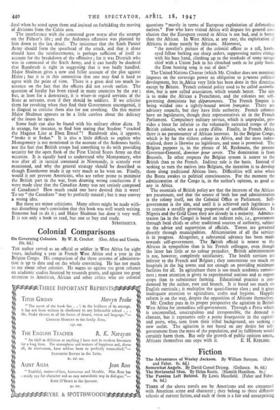Colonial Comparisons
Tim author served as an official or soldier in West Africa for eight years, including a year in French West Africa and a year in the Belgian Congo. His comparison of the three systems of administra- tion is up to date and on the whole convincing. He has not much to say about other colonies. He warns us against too great reliance on academic studies financed by research grants, and against too great attention to American, African and other critics who see colonial
questions "mostly in terms of European exploitation of defenceless natives." Few who have visited Africa will dispute his general con- clusion that the European record in Africa is not bad, and is better than the African. In West Africa, at any rate, the exploitation of Africans is done mostly by Africans. Moreover,
" the novelist's picture of the colonial officer as a tall, hawk- eyed fellow barking out sharp orders, suppressing native risings with his bare hand, climbing up to the stockade of some savage chief with a Union Jack in his clenched teeth as he gaily hums the Eton boating song is out of date."
The United Nations Charter (which Mr. Crocker does not mention) imposes on the sovereign power an obligation to pz•ignote political development, but in,Africa very little has been done in this direction except by Britain. 'French colonial policy used to be called assimila- tion, but is now called association, which sounds better. The aim is to make the African a Frenchman, and the colonies not self- governing dominions but apartements. The French Empire is being welded into a tightly-bound union francaise. There are advisory councils, but they have little authority. French colonies have no legislatures, though their representatives sit in the French Parliament. Compulsory military service, which is unpopular, pro- vides a force far inferior to the voluntarily recruited troops of the British colonies, who are a corps d'ilite. Finally, in French Africa there is no paramountcy of African interests. In the Belgian Congo, which is by far the richest colony in Africa, and the most indus- trialised, there is likewise no legislature, and none is promised. The Belgian purpose is, in the phrase of M. Ryckmans, the present Governor-General, dominer pour servir. The domination is from Brussels. In other respects the Belgian system is nearer to the British than to the French. Indirect rule is the basis. Instead of seeking to turn the natives into Belgians, the intention is to develop them along traditional African lines. Difficulties will arise when the Bantu awakes to political consciousness. For the moment the administration of the Congo is, in the author's opinion, as good as any in Africa.
The essentials of British policy are that the interests of the African are paramount, and that the source of both law and administration is the colony itself, not the Colonial Office or Parliament. Self- government is the aim, and until it is achieved each legislature is to contain a steadily growing proportion of unofficial Africans. In Nigeria and the Gold Coast they are already in a majority. Adminis- tration (as in the Congo) is based on indirect rule, i.e., government through local chiefs or other traditional sources of authority, subject to the advice and supervision of officials. Towns are governed directly through municipalities. Africanisation of all the services is in progress. Altogether, a substantial advance has been made towards self-government. The Bpitish official is nearer to the African in sympathies than is his French colleague, even though the latter has little or no colour prejudice. British administration is not, however, completely satisfactory. The health services are inferior to the French and Belgian ; they concentrate too much on hospitals in the big towns and not enough on providing minimum facilities for all. In agriculture there is too much academic remote-. ness ; more attention is given to experimental stations and to export crops than to subsistence farming. Educational practice is con- demned by the author, root and branch. It is based too much on English curricula ; it multiplies the quasi-literate class ; and it gives inadequate attention to agriculture, crafts and hygiene. Happily reform is on the way, despite the opposition of Africans themselves.
Mr. Crocker puts in its proper perspective the agitation in British West Africa for immediate self-government. Through a Press which is uncontrolled, unscrupulous and irresponsible, the demand is clamant, but it represents only a petite bourgeoisie in the capitals and ports, whot torn from their tribal background, are seeking a new outlet. The agitation is not based on any desire for self- government from the mass of the population, and its fulfilment would certainly harm them. But only the growth of public opinion amon, Africans themselves can cope with it. E. H. KEELING.


































 Previous page
Previous page